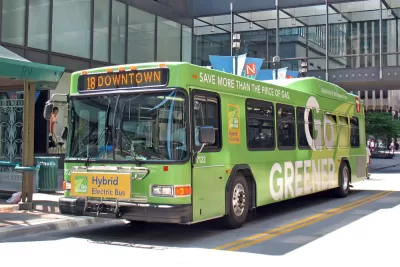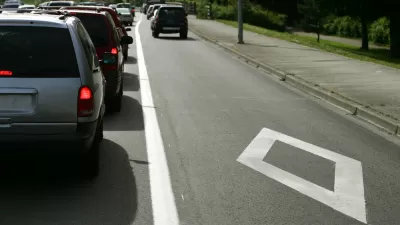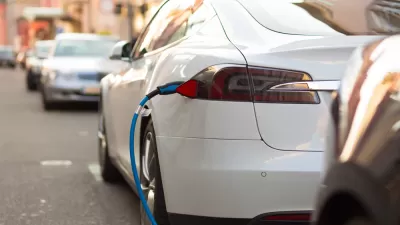Two widely cited University of Michigan transportation researchers urge consumers to drive more fuel efficient vehicles to reduce their own carbon emissions as President Trump works to relax vehicle fuel economy standards.

As President Trump turns back the clock on mitigating greenhouse gas emissions, individual actions to reduce one's own carbon footprint become ever more important. According to a paper (pdf) written by University of Michigan Transportation Research Institute researchers Michael Sivak and Brandon Schoettle in support of the 2015 Paris Climate Agreement, the most effective action a person concerned about climate change can do is to drive a fuel-efficient vehicle.
Sivak and Schoettle, who monitor the fuel economy of new vehicles purchased (as opposed to manufactured) on a monthly basis, have found that after gas prices began falling in July 2014, the average miles per gallon flatlined after having risen from 21 miles per gallon for model year 2008 to 25 mpg for model year 2014. [See graph].
"The main reason was the drop in the price of gasoline to $2.14 in 2016 from $3.36 a gallon in 2014" write Sivak and Schoettle in a New York Times Sunday Review opinion. Average gas prices on March 29 were $2.29.
Now, fueling a less fuel-efficient but more spacious vehicle like an S.U.V. or pickup truck costs no more than fueling a small sedan did a few years ago. And buyers have responded by buying more of those bigger, less fuel-efficient vehicles.
And the auto sales figures reflect that preference larger vehicles. Last year, light trucks, a category of passenger vehicles that include popular sport utility and crossover vehicles, outsold more fuel-efficient cars, accounting for a record 61 percent of auto sales. In fact, those sales figures were indirectly referenced by Environmental Protection Agency Scott Pruitt as justification for reducing vehicle emissions standards.
"We ought to focus on fuel efficiency for cars that people really want to buy," Pruitt stated on a Sunday news show on March 26 (posted here).
On March 15, President Trump announced that he had ordered the U.S. Environmental Protection Agency and the Department of Transportation to reopen the review of fuel efficiency standards for model year 2022-2025 passenger vehicles in order to ease the Obama-era ruling.
Notwithstanding Trump's executive order on Tuesday to dismantle the Clean Power Plan, emissions from U.S. power plants continue to decrease while those from transportation are on the rise, according to research (pdf) by Sivak and Schoettle posted here last July.
FULL STORY: What You Can Do About Climate Change

Alabama: Trump Terminates Settlements for Black Communities Harmed By Raw Sewage
Trump deemed the landmark civil rights agreement “illegal DEI and environmental justice policy.”

Study: Maui’s Plan to Convert Vacation Rentals to Long-Term Housing Could Cause Nearly $1 Billion Economic Loss
The plan would reduce visitor accommodation by 25% resulting in 1,900 jobs lost.

Planetizen Federal Action Tracker
A weekly monitor of how Trump’s orders and actions are impacting planners and planning in America.

Waymo Gets Permission to Map SF’s Market Street
If allowed to operate on the traffic-restricted street, Waymo’s autonomous taxis would have a leg up over ride-hailing competitors — and counter the city’s efforts to grow bike and pedestrian on the thoroughfare.

Parklet Symposium Highlights the Success of Shared Spaces
Parklets got a boost during the Covid-19 pandemic, when the concept was translated to outdoor dining programs that offered restaurants a lifeline during the shutdown.

Federal Homelessness Agency Places Entire Staff on Leave
The U.S. Interagency Council on Homelessness is the only federal agency dedicated to preventing and ending homelessness.
Urban Design for Planners 1: Software Tools
This six-course series explores essential urban design concepts using open source software and equips planners with the tools they need to participate fully in the urban design process.
Planning for Universal Design
Learn the tools for implementing Universal Design in planning regulations.
Caltrans
Smith Gee Studio
Institute for Housing and Urban Development Studies (IHS)
City of Grandview
Harvard GSD Executive Education
Toledo-Lucas County Plan Commissions
Salt Lake City
NYU Wagner Graduate School of Public Service





























